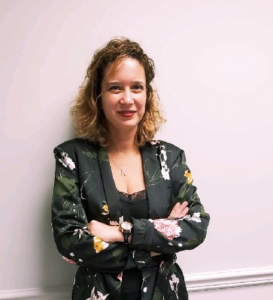By Krista Henry
Krista Henry offers a look at how young communicators are honing their project and change management skills by helping turn small businesses around through digital transformation amidst the COVID-19 pandemic.

Last year saw rapid changes in the ways we do business, with organizations pivoting or speeding up their use of technology for operations. Working in tandem with technology teams are communicators, who bring the human touch to the customer experience and change management success. Recently, a group of University of Waterloo co-op students showed the impact of communicating in the digital space to help small businesses transform their operations to adapt to the new normal.
Communitech, an organization dedicated to supporting the tech community, has been working with partners on delivering the Digital Main Street program to help small businesses achieve digital transformation. Through Digital Main Street, Communitech employed groups of student communicators to support small businesses. The student teams consist of a digital marketer, copywriter, UX/UI web designer, graphic designer, web developer and business analyst roles.
Over four weeks, these teams helped small-and-medium-sized businesses – such as retail shops, independent restaurants, art, and cultural organizations and more – weather the current economic storm and tackle business digitally. The students brought fresh perspectives, new website creations and strengthened clients’ social media presence.
“We grew up in a digital world and are familiar with being marketed to online, we know what works,” says Dana Grace MacMillan, a Fine Arts major who worked on the project as a graphic designer. “Our greatest strength is coming to business owners who aren’t familiar with social or online platforms and providing tangible communications tools to use in their business. We gave them training and coaching on how to best communicate on Instagram and other platforms.”
MacMillan and her team helped a small music store build their first website, transitioning them from a solely brick and mortar establishment into the digital world. “Another project we worked on was a sugaring hair removal business and helping the owner refine her digital marketing plan. She was overwhelmed with how to establish her business online, so we helped organize her online brand, gave her social media templates she could easily use and define her customer profiles,” she said.
“It was a very rewarding experience. We did in four weeks what would have taken them six months to do on their own, or they would have had to hire someone full time for an extended period,” she added.
New perspectives
As young communicators, these students not only brought their strong digital communication skills to the table, but a willingness to test various methods to attract new customers for their clients. According to student web designer Devin Zhou, building strong relationships with their clients was key in helping to obtain buy-in for change.
“We always did our market research looking at various demographics and coming to the client with a well laid-out communications plan,” Zhou says.
One of the projects Zhou worked on was transitioning a small grilling manufacturer to an e-retail platform. “They needed us to transition their business online because with COVID-19 they could no longer travel to conventions to sell their products. We built them a new website and optimized their social media channels. We made their website visually appealing with simple language, we watched how many views we received and adapted our strategies to see what content attracted more people,” he said. “They told us their customers really like the new website, and it’s been a success.”
Tips for digital transformation
As generation Z communication and marketing talent enters the workforce, they will drive further change in the digital space. Here are four tips these students learned in managing transformation:
1. Try a variety of platforms
“I worked with a photographer who wanted to promote her business online. We tried a variety of tools introducing her to a new social media platform. After watching a few TED Talks on similar businesses, we tried Tik Tok which is a growing platform. She was able to give lessons on how to take photos using her work samples,” says Economics major, Justin Chik, student digital marketer.
2. Authenticity is key in reaching audiences
“For an auto shop we worked with, I would focus mainly on Google ads as most people look for recommendations from others. We encouraged customers to give their feedback and leave Google reviews so clients could see that this was a trustworthy business,” says Chik.
3. Leverage data and research for stakeholder engagement
“Before presenting to the client, we could analyze their data and information provided. We built our buyer personas for their business – that is who is buying their products, what are their age groups, what’s happening in the industry, so that we can create a plan that is dedicated to reaching their audience,” says Zhou.
4. Teamwork and delegation drive projects forward
“We recognized early on that we are mini experts in each area of the team who had to come together to make these projects work. You have to recognize the skill set of others, learn from each other and let them take charge of what they are best at,” says MacMillan.
The Digital Main Street project showcases that businesses can rapidly adjust to a changing world. Willingness to move at a fast pace is a must and so is having young communicators on our teams – their ingenuity and technical skills are needed to weather the digital landscape and lead the change.
 Krista Henry has 15 years of experience as a professional writer. She has worked as a journalist and communications professional in the government, non-profit and retail industries in Jamaica and Canada. Passionate about diversity and inclusion, she is the incoming co-chair of IABC Toronto’s Inclusion, Diversity, Equity and Accessibility (IDEA) committee. She currently works at the University of Waterloo as a communications specialist assisting in developing next-generation communications talent. Connect with Krista on LinkedIn
Krista Henry has 15 years of experience as a professional writer. She has worked as a journalist and communications professional in the government, non-profit and retail industries in Jamaica and Canada. Passionate about diversity and inclusion, she is the incoming co-chair of IABC Toronto’s Inclusion, Diversity, Equity and Accessibility (IDEA) committee. She currently works at the University of Waterloo as a communications specialist assisting in developing next-generation communications talent. Connect with Krista on LinkedIn
Return to the Spring 2021 Issue of Communicator
READ MORE

Communicator January 2025: Accessibility and Artificial Intelligence (AI)
In our January edition, we explore how Accessibility and Artificial Intelligence (AI) are reshaping the communications landscape, balancing cutting-edge innovation with empathy and inclusion for a rapidly evolving future. Read […]
10 Goals for Growth for 2025
By Mandy Silverberg Mandy Silverberg offers goal setting tips for communicators to grow personally and professional in 2025. Looking to grow professionally and personally in 2025? Start […]
How AI Can Make us Better Professionals
By Bryan G. Jones, Founder and CEO BGJ Global Business owner Bryan G. Jones discusses the impact of artificial intelligence on the role of communicators and offers tips on […]
Communicating your message in multiple languages
By Linda Bicho-Vachon Linda Bicho-Vachon looks at AI translation tools and whether they can reduce our reliance on human translators. If you’re a multi-national company, communicating a […]
Communicating across cultures
Making messages meaningful in a multicultural world By Roopal Chaturvedi “As communicators, our task is clear: make messages land, not bounce.” Roopal Chaturvedi describes the challenges of communicating across cultures […]